Understanding the Unique Challenges of Medication and Substance Use in Seniors
As the population ages, an increasing number of older adults find themselves managing multiple medications alongside potential substance use disorders. This demographic experiences unique physiological and psychological vulnerabilities that influence how medications and substances affect their bodies and minds. Understanding these challenges is critical for seniors, caregivers, and healthcare providers aiming to promote safe medication use and manage coexisting substance abuse and mental health concerns effectively.
Physiological Changes in Aging and Their Impact on Medication Effects
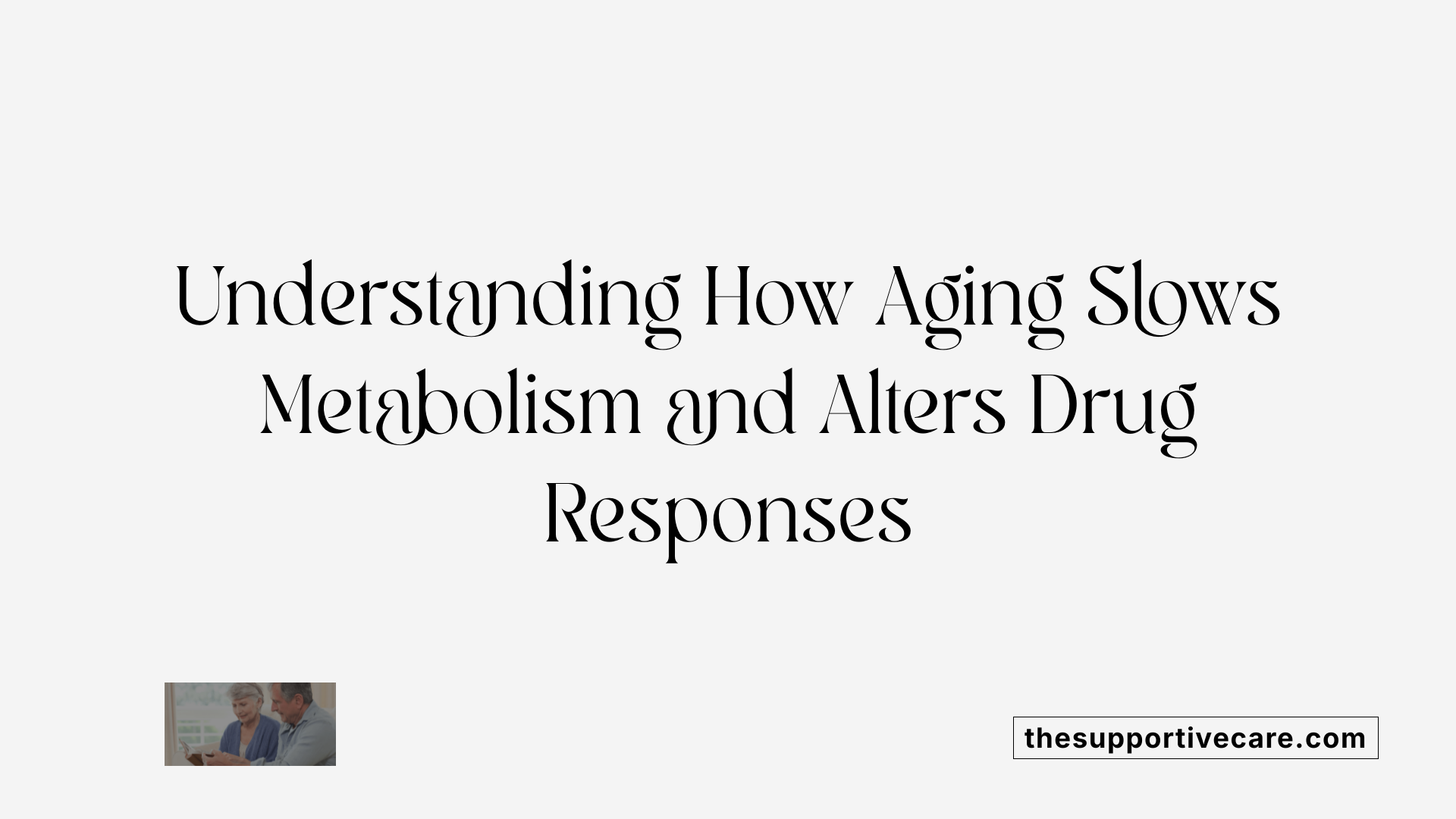
How do physiological changes in aging affect medication use in seniors?
As people age, their bodies undergo significant physiological changes that influence how medications are processed and their overall effects. One major change is slower metabolism; older adults can experience up to a 30% reduction in drug clearance. This slowdown means drugs remain in the system longer, increasing the chances of accumulation and toxicity.
Additionally, seniors tend to have lower body fat and altered body composition, which affects drug distribution. Fat-soluble drugs may concentrate differently, sometimes leading to heightened or prolonged effects. The aging brain also becomes more sensitive to substances, making older adults more vulnerable to the cognitive and central nervous system side effects of medications and alcohol.
Another critical factor is polypharmacy, where older adults often take multiple medications to manage chronic conditions. This raises the risk of adverse drug reactions and dangerous interactions. Polypharmacy demands careful management to avoid accidental misuse and worsening mental health symptoms.
Overall, these physiological changes require tailored medication regimens and vigilant monitoring to reduce risks and improve safety for seniors.
Common Substances of Abuse Among Older Adults and Their Risks
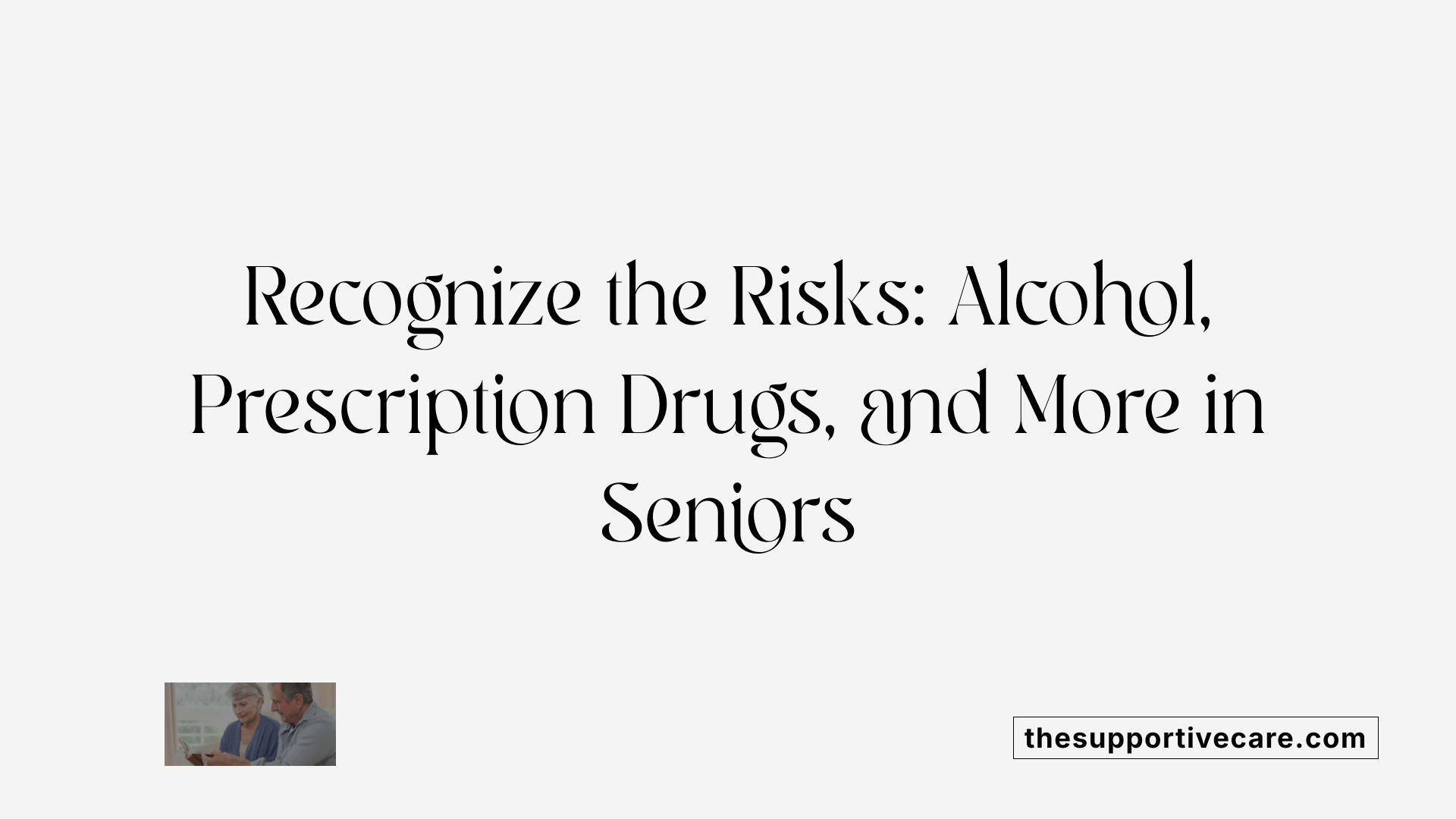
What substances are commonly misused by older adults and what are the associated risks?
Alcohol is the most commonly misused substance in older adults, with about 65% of seniors reporting high-risk drinking and over 10% engaging in binge drinking. This pattern significantly worsens health issues such as diabetes, hypertension, liver problems, osteoporosis, memory loss, and mood disorders. Given their increased sensitivity due to aging, even small amounts of alcohol can cause marked intoxication and cognitive impairment.
Prescription medications are also frequently misused among older adults, particularly opioids and benzodiazepines. Opioids, used by 4-9% for pain management, are linked to risks of confusion, falls, breathing difficulties, overdose, and death. Benzodiazepine misuse is associated with increased anxiety, depression, and cognitive decline. Polypharmacy, or taking multiple medications for chronic conditions, raises the likelihood of dangerous drug interactions and accidental misuse.
Marijuana use has increased in this population, from 0.4% in 2006-2007 to 2.9% in 2015-2016, often for medical reasons such as pain or sleep problems. However, marijuana carries potential adverse effects, including memory problems, cardiovascular issues, and a higher risk of falls, especially with high-potency products. Additionally, illicit substances like heroin and cocaine are on the rise among older adults, exacerbating cognitive and cardiovascular risks.
Substance misuse in seniors is frequently underrecognized due to societal stigma and symptoms overlapping with typical aging or chronic health conditions. This underdetection prevents timely intervention, increasing health complications.
Understanding and addressing these common substances and their risks are essential to improving health outcomes in older adults struggling with substance use disorders.
Comprehensive Treatment Services for Older Adults with Substance Use and Mental Health Issues

What are the comprehensive treatment services available for substance abuse and mental health issues?
Treatment for older adults facing substance use and mental health challenges requires an integrated, personalized approach. Effective care models combine behavioral therapies such as cognitive-behavioral therapy (CBT), dialectical behavior therapy (DBT), and motivational interviewing. These therapies help seniors develop coping strategies, address underlying emotional issues, and improve motivation for recovery.
Medication-assisted treatment (MAT) plays a crucial role in managing substance use disorders. FDA-approved medications like methadone, buprenorphine, and naltrexone are used to reduce cravings and withdrawal symptoms, particularly for opioid and alcohol use disorders. Combining these medications with counseling and behavioral therapies enhances treatment success.
Managing coexisting chronic conditions is a vital part of comprehensive care. Many older adults face multiple health issues that can complicate recovery, so treatment programs integrate physical health management to improve overall well-being. Support network rebuilding is also essential, as social isolation can worsen addiction and mental health problems. Programs often involve family therapy or community support groups to reconnect seniors with positive influences.
Staff training in evidence-based practices ensures that healthcare providers understand the unique needs of older adults, including physiological changes, medication interactions, and psychological factors. Longer durations of care and integrated models—where substance use treatment is coordinated with mental and physical healthcare—are associated with better outcomes.
This holistic approach improves seniors' quality of life by addressing the full spectrum of challenges posed by substance abuse and mental health issues, encouraging sustained recovery and healthier aging.
Addressing Co-Occurring Mental Health Conditions in Seniors with Substance Use Disorders
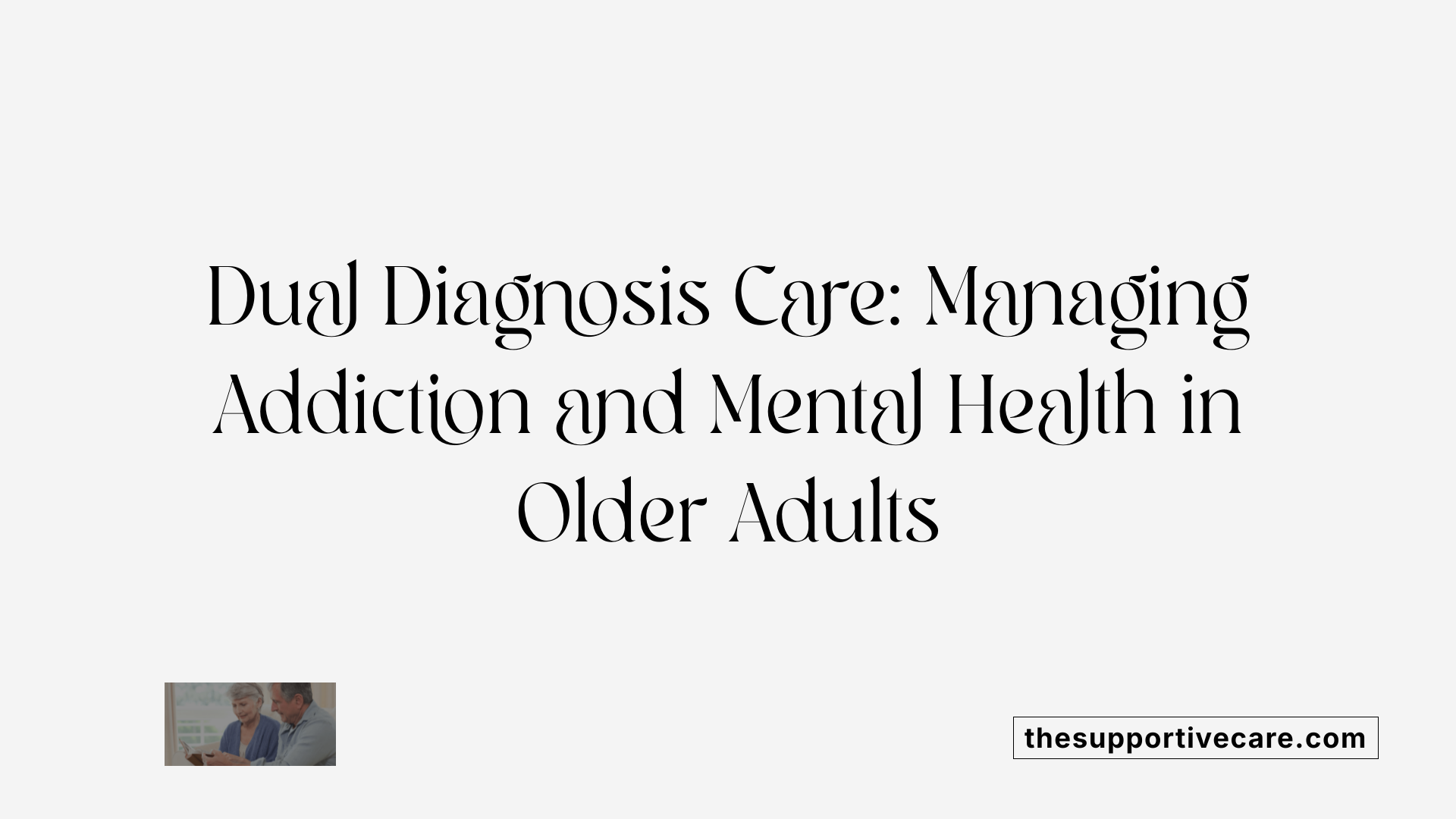
What Are Common Mental Health Disorders in the Elderly?
Older adults frequently face mental health challenges including depression, psychosis, Alzheimer’s disease, dementia, and Parkinson’s disease. Depression alone affects up to 2% of seniors beyond age 55, worsening due to factors like neurotransmitter decline and oxidative stress. Psychosis in late life often manifests alongside neurodegenerative conditions, bringing symptoms such as delusions and delirium. These complex conditions frequently overlap with cognitive decline seen in dementia or Alzheimer’s.
Why Is Dual Diagnosis Complex?
When substance use disorders (SUDs) coexist with mental health disorders, they create a dual diagnosis that complicates detection and treatment. Older adults often experience overlapping symptoms, making it challenging to separate effects of aging, mental illness, and substance misuse. This complexity increases risks of relapse and poorer health outcomes if not properly addressed.
How Do Treatment Programs Address Both Addiction and Underlying Mental Health Conditions Simultaneously?
Effective programs use integrated treatment models that combine behavioral therapies like cognitive behavioral therapy (CBT) and dialectical behavior therapy (DBT) with medication management tailored for older adults. Coordinated care involves specialists for mental health and addiction working together, supported by psychosocial interventions and family therapies. These holistic approaches simultaneously address substance misuse and underlying mental illnesses, improving engagement and retention.
What Therapies Are Tailored for Co-Occurring Conditions?
Therapies such as individual counseling, group therapy, and family interventions are adapted for seniors with dual diagnoses. Medication-Assisted Treatment (MAT) using FDA-approved drugs complements behavioral therapies to stabilize brain chemistry and reduce cravings. Non-pharmacologic methods including mindfulness, exercise, and lifestyle changes further support mental health and reduce dependence on substances.
Why Is Integrated Dual-Diagnosis Treatment Important?
Integrated treatment offers a comprehensive strategy for tackling the intertwined issues of addiction and mental health. It improves clinical outcomes by reducing relapse rates, addressing cognitive and emotional challenges, and fostering social support networks. Older adults often achieve recovery outcomes equal to or better than younger groups when receiving such coordinated care.
How Does Addressing Co-Occurring Conditions Enhance Recovery and Reduce Relapse?
By tackling both substance use and mental health disorders concurrently, patients receive more personalized care that meets their complex needs. This approach reduces risk factors like medication misuse and untreated depression, stabilizes mood and cognition, and improves quality of life. Enhanced recovery is marked by sustained abstinence and better physical and psychological well-being.
| Topic | Details | Notes |
|---|---|---|
| Common Disorders | Depression, psychosis, dementia, Alzheimer’s, Parkinson’s | Age-related neurodegeneration increases prevalence |
| Dual Diagnosis Complexity | Overlapping symptoms complicate diagnosis and treatment | Risk of underdiagnosis and relapse |
| Therapy Approaches | CBT, DBT, family therapy, MAT, mindfulness, physical activity | Tailored for cognitive and physical status of seniors |
| Integrated Treatment | Combines mental health and SUD care in one coordinated program | Leads to improved retention and outcomes |
| Recovery Benefits | Addresses root causes, reduces relapse, improves quality of life | Recovery in seniors can match or exceed younger populations |
Medication-Assisted Treatment (MAT) and its Role in Managing Addiction in Older Adults
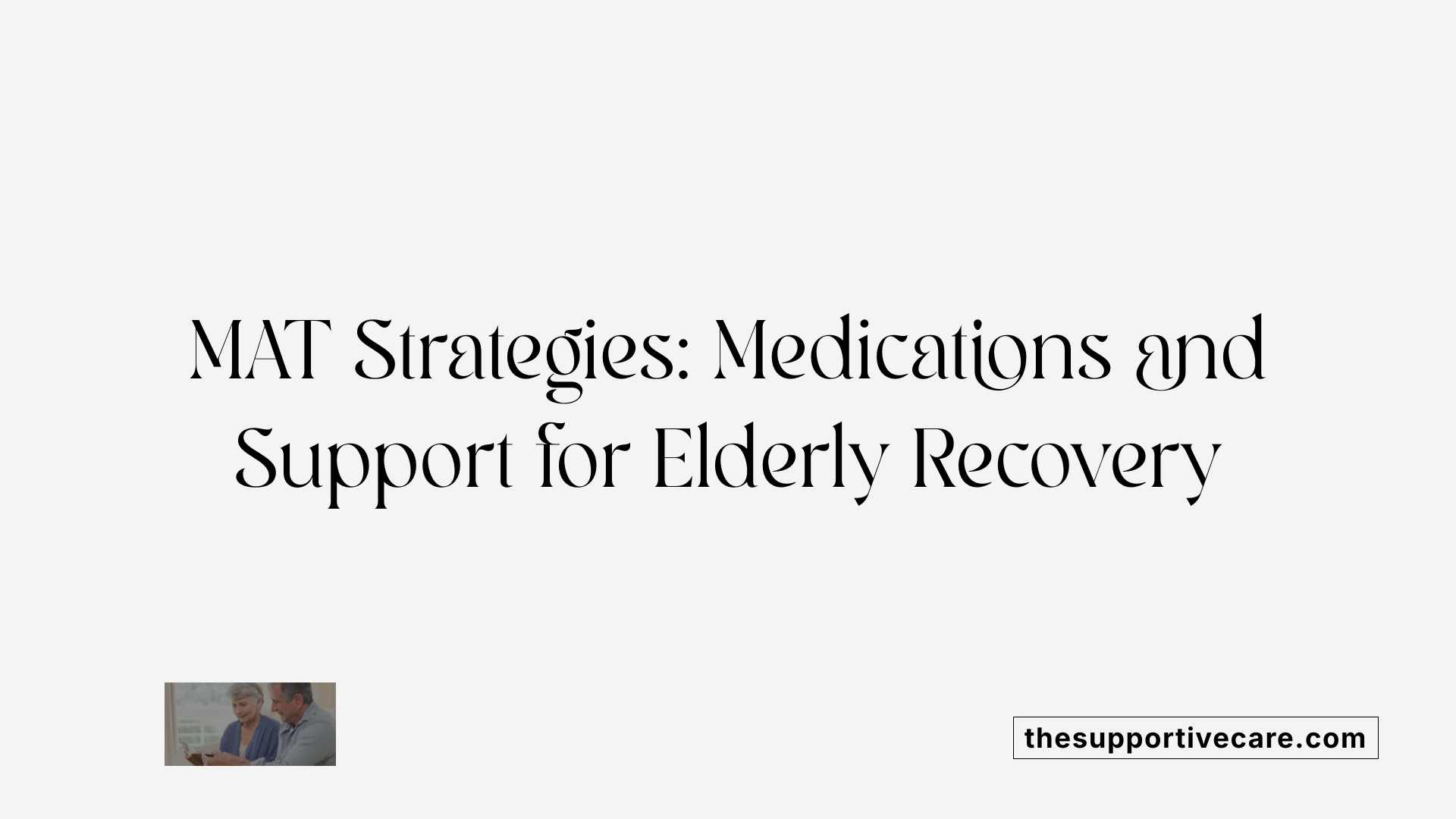
What is Medication-Assisted Treatment (MAT)?
Medication-Assisted Treatment (MAT) combines FDA-approved medications with counseling and behavioral therapies to treat substance use disorders effectively. It plays a vital role in addiction recovery by addressing the physical and psychological aspects of dependence.
FDA-Approved Medications for Alcohol and Opioid Use Disorders
Several medications are specifically approved for treating alcohol and opioid use disorders in older adults:
- Alcohol Use Disorder (AUD): Acamprosate, disulfiram, and naltrexone help reduce cravings and prevent relapse.
- Opioid Use Disorder (OUD): Buprenorphine, methadone, and naltrexone normalize brain chemistry, block euphoric effects, and alleviate withdrawal symptoms.
How MAT Works to Support Recovery
MAT helps to restore balanced brain function disrupted by addiction. By reducing cravings and blocking the effects of alcohol or opioids, it lowers the risk of relapse. This stabilization improves treatment retention and overall patient survival.
Integration into Comprehensive Treatment Programs
MAT is most effective when combined with behavioral therapies such as cognitive-behavioral therapy or motivational enhancement. This integrated approach addresses underlying issues and supports rebuilding social networks and coping strategies.
Accessibility and Models of Care
Buprenorphine can be prescribed conveniently in physician offices, improving access, especially for older adults less likely to seek traditional addiction services. Low barrier models reduce restrictions, meeting individuals where they are to encourage engagement and retention.
Benefits of MAT for Older Adults
Beyond controlling addiction symptoms, MAT helps prevent overdose deaths through medications like naloxone. It enhances the quality of life for older adults by supporting longer care durations and coordinated treatment tailored to their needs.
Table: Overview of MAT Medications and Features
| Medication | Target Disorder | How It Helps |
|---|---|---|
| Acamprosate | Alcohol Use Disorder | Reduces cravings and supports abstinence |
| Disulfiram | Alcohol Use Disorder | Causes adverse reactions to alcohol |
| Naltrexone | Alcohol & Opioid Use | Blocks effects and reduces cravings |
| Buprenorphine | Opioid Use Disorder | Partial opioid agonist that eases withdrawal |
| Methadone | Opioid Use Disorder | Full opioid agonist for maintenance therapy |
Medication-Assisted Treatment remains a cornerstone in managing addiction in older adults, improving outcomes through physiological support and enhanced accessibility.
Therapeutic Approaches Beyond Medication: Behavioral and Holistic Treatments
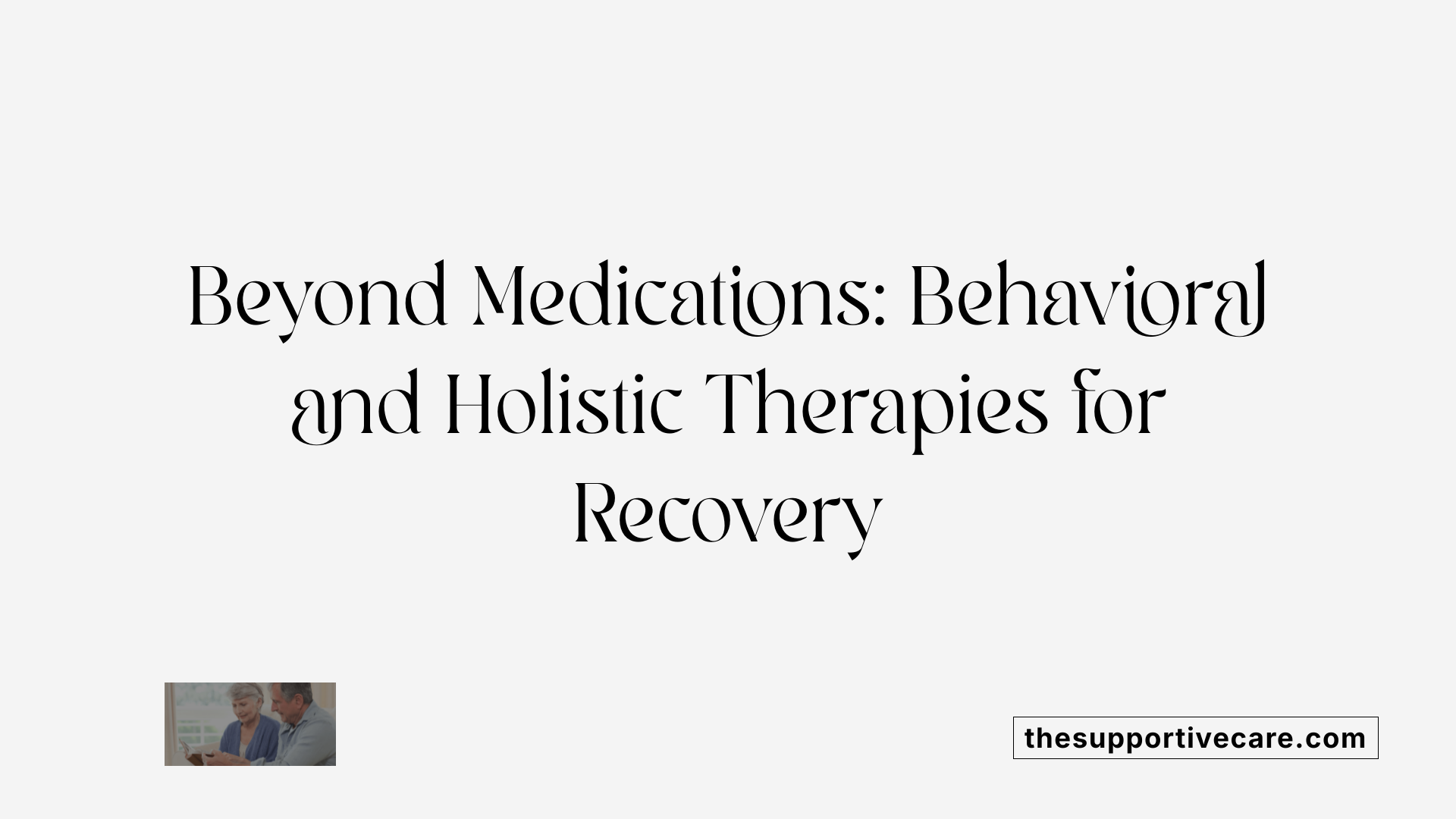
What types of therapies are commonly used in addiction and mental health treatment?
Treatment for substance use and mental health disorders in older adults often includes a variety of behavioral therapies tailored to their unique needs. Cognitive-behavioral therapy (CBT) and dialectical behavior therapy (DBT) are widely used to help seniors develop healthier coping strategies and manage emotional distress. Motivational interviewing encourages personal motivation and commitment to change, enhancing treatment engagement.
Family therapy and group therapy provide crucial social support and improve communication, helping rebuild the support networks that many older adults may have lost. Contingency management offers incentives for maintaining sobriety, and 12-step facilitation programs provide structured peer support for ongoing recovery.
How do holistic treatments contribute to addiction recovery in older adults?
Holistic therapies such as mindfulness-based stress reduction (MBSR), yoga, acupuncture, and regular physical activity complement traditional behavioral therapies. These approaches improve emotional resilience, reduce stress, and promote overall wellness, helping to minimize the reliance on medications.
By incorporating mind-body practices, older adults can better manage cravings, anxiety, and depression, which often accompany substance use disorders and mental health conditions. These methods also encourage healthier lifestyle habits and foster a sense of empowerment and well-being.
Together, behavioral and holistic treatments provide a comprehensive framework for recovery that respects the complexity of aging, mental health, and addiction. This integrated approach improves treatment retention and quality of life for older adults facing these challenges.
The Importance of Aftercare and Ongoing Support in Senior Recovery

How important is aftercare and ongoing support in maintaining long-term recovery from addiction and mental health disorders?
Aftercare and ongoing support play a vital role in sustaining long-term recovery for older adults facing addiction and mental health challenges. Recovery extends well beyond initial treatment, requiring continuous care to prevent relapse and promote lasting wellness.
Peer support groups (AA, NA)
Participating in peer support groups such as Alcoholics Anonymous (AA) and Narcotics Anonymous (NA) provides seniors with a community of shared experience and encouragement. These groups foster accountability and offer emotional support, helping individuals navigate the challenges of maintaining sobriety in everyday life.
Outpatient therapy and medication management
Outpatient therapy services deliver ongoing professional care tailored to seniors, including behavioral therapies and medication-assisted treatment when needed. Regular medication management ensures safe use of prescribed drugs, reducing risks of relapse due to improper medication use or untreated symptoms.
Relapse prevention planning
Customized relapse prevention plans identify personal triggers and coping strategies unique to each senior. By understanding situations or emotions that may lead to substance use, seniors can develop tools to effectively manage cravings and setbacks, strengthening their resilience against relapse.
Environmental and social support factors
Stable living environments, meaningful employment or activities, and supportive relationships significantly lower the chances of returning to substance use. Family involvement and community engagement improve emotional health and provide protective social networks critical for sustaining recovery.
Sustaining sobriety and mental wellness
Maintaining sobriety is closely tied to managing mental health in older adults. Integrated support addressing both addiction and mental well-being contributes to enhanced quality of life. Continued engagement in treatment, therapy, peer groups, and healthy lifestyle choices empowers seniors to live fulfilling, substance-free lives.
Supporting Seniors in Safe Medication Use and Addiction Recovery
Seniors face unique challenges in managing medications and addressing substance use and mental health disorders, amplified by physiological changes, polypharmacy, and increased vulnerability to side effects. Comprehensive, integrated treatment models that combine evidence-based behavioral therapies, medication-assisted treatments, and holistic supports offer the best outcomes. Equally vital are personalized aftercare plans and ongoing support systems that promote sustained recovery and overall well-being. Awareness and coordinated care between healthcare providers, families, and communities are essential to ensuring safe medication use and successful recovery journeys for older adults.
References
- Substance Use in Older Adults DrugFacts - nida.nih.gov
- Chapter 1—Older Adults and Substance Misuse - NCBI
- Substance Abuse in the Elderly
- How Does Aging Affect Mental Illness and Addiction?
- Medications for Substance Use Disorders
- Older Adults and Substance Use Disorder
- Prescription Drug Addiction
- Therapy For Substance Abuse Treatment
- The Different Types of Drug Addiction Therapy
- Substance Use Disorder (SUD): Symptoms & Treatment



































































































